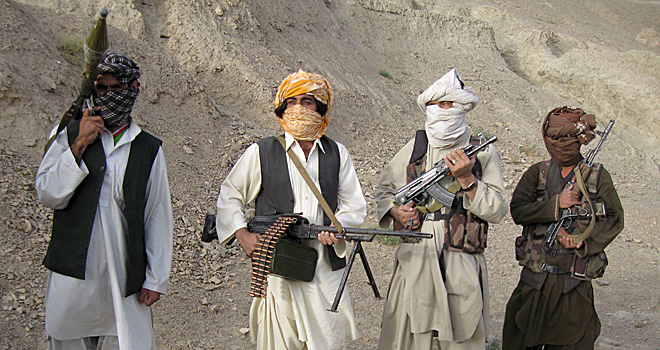Taliban Reaches Helmand Capital
Taliban makes another advancement

NEW DELHI: Taliban militants have advanced in their fighting against NATO-backed government forces, reaching the capital of Afghanistan’s southern Helmand province on Tuesday.
As the militants approached Lashkar Gah town after two days of fighting, thousands of residents fled the city. The fighting has threatened Highway One -- the main transport artery linking the major southern city of Kandahar with Herat.
Reports of fighting came in from near Herat as well, with the Taliban having raised their flag in the main centre of Ghurian district, Herat’s police chief, General Abdul Majid Rozi said.
Further, at the time of writing, reports indicated that the Taliban killed at least 22 police officers and captured a major district in the northern province of Faryab. The officials said that an Afghan Army base of several hundred soldiers and a road-construction camp housing Afghan police officers remained surrounded in the district, Ghormach.
Afghan President Ashraf Ghani chaired a meeting of the National Security Council and ordered military forces to step up combat operations to beat back the militants.
The latest advancements come three weeks after the Taliban captured the city of Kunduz in northern Afghanistan, which was the militant group’s most decisive victory since the ouster of their regime in 2001. A few days after the capture of Kunduz, the Taliban advanced to Warduj district of Badakhshan.
The capture of Kunduz seems to have emboldened the militants, marking a clear shift in strategy as a more aggressive onslaught leads to heavy fighting across Afghanistan.
The fall of Kunduz also prompted a change in the United State’s plans for Afghanistan, with President Barack Obama announcing that thousands of troops will remain in Afghanistan at least till the end of his term in 2017. The decision marks a major reversal of U.S. policy, with one of Obama’s key commitments having been the end of the war in Afghanistan and bringing U.S. troops home.
In a brief statement from the White House, President Obama -- who had recently declared “the light of a new day on the horizon” in Afghanistan -- said that “I will not allow Afghanistan to be used as safe haven for terrorists to attack our nation again.” U.S. troops, the President reasoned, were vital to the security of the United States and Afghanistan, where the Taliban-led insurgency has gained momentum recently.
The Afghan government welcomed the decision. The move would help "stability" in Afghanistan, the government said in a statement.
The decision to keep US troops in Afghanistan also comes as the country sees an upswing in violence, with recent UN report noting that the war in Afghanistan is killing or wounding increasing numbers of civilians, with women and children showing the sharpest rise in casualties. Figures for the first six months of 2015 put the year on the path to become the worst year yet in Afghanistan in terms of casualties.
Further, the latest developments follow a huge blow to a nascent peace dialogue. The Taliban had agreed -- for the first time in 13 years -- to talk to the Afghan government, in a negotiation brokered by neighbouring Pakistan. The talks collapsed over news of Taliban leader Mullah Omar’s death, with the rapprochement of ties between Afghanistan and Pakistan taking a major blow as result.
In the weeks that have followed, the side that has opposed talks and negotiations with the government seems to have swelled, with the Taliban stepping up the violence. The latest news that the US is continuing to keep troops at current numbers in Afghanistan will further the gap between the militants and government, with the former vowing to drive out American presence in the war torn country.



